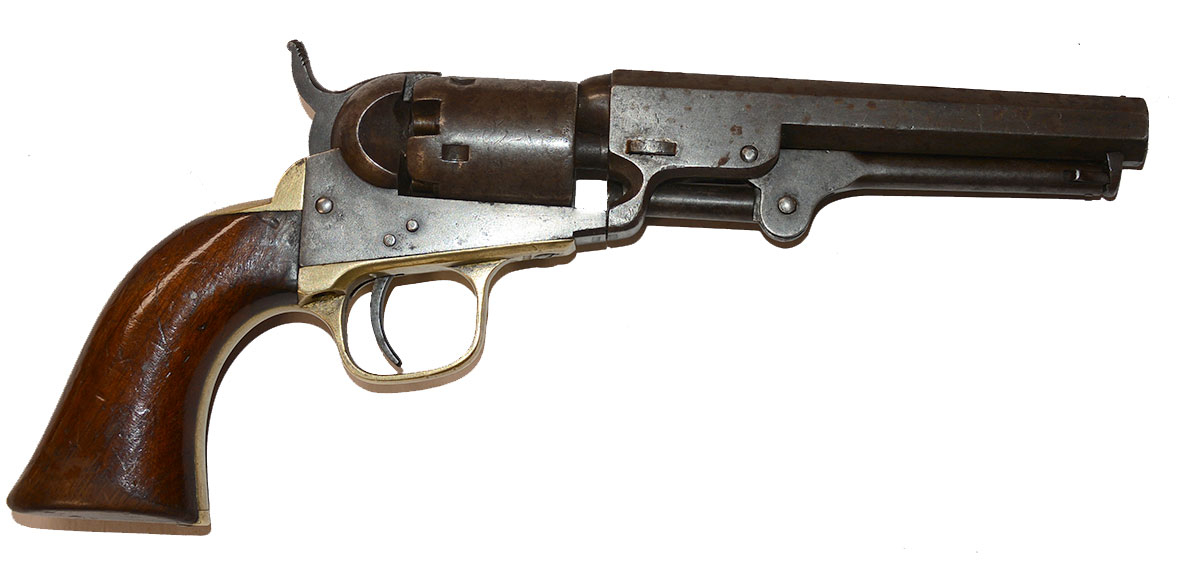site search
online catalog
EXCEPTIONALLY RARE BALTIMORE CITY POLICE ENGRAVED COLT POCKET REVOLVER

Hover to zoom












$5,500.00
Quantity Available: 1
Item Code: 490-3167
Shipping: Determined by Method & Location of buyer
To Order:
Call 717-334-0347,
Fax 717-334-5016, or E-mail
The venerable Colt Model 1849 Pocket Revolver could be found the world over before and during the Civil War. Combining the adequate power of .31 caliber with a healthy powder charge, and a small size that could be concealed relatively easily compared to Colt’s other offerings, this model of revolver became one of the company’s most popular offerings.
This pistol is a 5” barrel configuration, with Colt offering several barrel lengths – most commonly shorter but some select few were offered in slightly longer barrel lengths. The 5” length was considered that “do it all” version with the ability to be carried openly as a service pistols, or concealed under clothing.
The condition of this revolver is good – the action and timing are both excellent. A somewhat dull bore does not detract from the strong rifling still present. Much of the original bluing is gone, but the pistol is not pitted and features a nice, subtle patina. All brass shines with a nice mellow hue. All serialized parts are deeply stamped “171732” and fully match.
The most distinguishing feature of this pistol can be seen on the brass backstrap – a script engraving that reads “Baltimore City Police”. According to records, most of these Colt Pocket Revolvers were issued to the Baltimore Police from 1857-1869. The Baltimore Police were among the first, if not the very first, to issue sidearms to patrol officers. The Colt revolvers were replaced in the 1880’s and 1890’s with Smith and Wesson cartridge revolvers in .38. In December of 1856, Baltimore’s City Council proposed a plan to provide the city police with muskets to be kept in station house armories for the express purpose of suppressing riots. However, within a year – and mostly thanks to political violence and intimidation perpetrated by gangs across the city - it was decided that the safety of officers and the public could be better secured if patrol officers were armed. These Colt pistols traveled into every neighborhood, often providing armed escorts for citizens to reach polling places during elections without being harassed by opposing political groups and gave officers more fortitude to intervene in active crimes. Interestingly, a training program was implemented by the council and police chief when several officers drew revolvers on each other during workplace disagreements.
Not just another common Colt Pocket Revolver, the documentation and condition would make this a centerpiece of any Civil War weaponry collection and appeals to a broad range of interests. In fact, this pistol played an understated but very significant role in shaping modern policing doctrine in the United States in a divided, flashpoint city of the period.
Very few of these specific pistols survive, and this is surely one of the exceedingly rare chances to add one to your collection. [cm][ph:L]
DISCLAIMER: All firearms are sold as collector's items only - we do not accept responsibility as to the shooting safety or reliability of any antique firearm. All firearms are described as accurately as possible, given the restraints of a catalog listing length. We want satisfied customers & often "under" describe the weapons. Any city or state regulations regarding owning antique firearms are the responsibility of the purchaser. All firearms are "mechanically perfect" unless noted, but again, are NOT warranted as safe to fire!
~~~~~~~~~~~~~~~~~~~~~~~~~~~~~~~~~~~
THIS ITEM, AS WITH ALL OTHER ITEMS AVAILABLE ON OUR WEB SITE,
MAY BE PURCHASED THROUGH OUR LAYAWAY PROGRAM.
CLICK HERE FOR OUR POLICIES AND TERMS.
THANK YOU!
Inquire About EXCEPTIONALLY RARE BALTIMORE CITY POLICE ENGRAVED COLT POCKET REVOLVER
Most Popular
Historical Firearms Stolen From The National Civil War Museum In Harrisburg, Pa »
Theft From Gravesite Of Gen. John Reynolds »
Selection Of Unframed Prints By Don Troiani »
Fine Condition Brass Infantry Bugle Insignia »
Large English Bowie Knife With Sheath 1870’S – 1880’S »
Imported (Clauberg) Us Model 1860 Light Cavalry Officer's Saber »
featured item
SCARCE, IDENTIFIED AND SOLDIER-MODIFIED ISSUE INFANTRY OVERCOAT: EMANUEL CAVE CO. H 69th OHIO, WIA MISSIONARY RIDGE
This regulation issue infantry overcoat was brought home by Emanuel Cave. Co. H, 69th Ohio, descended directly in the family to a great-grandson along with Cave’s knapsack and canteen, comes with two old handwritten and one typewritten notes on the… (1268-273). Learn More »
site search
Upcoming Events
The shop is currently closed so that we may conduct our annual inventory. We are available by phone… Learn More »


